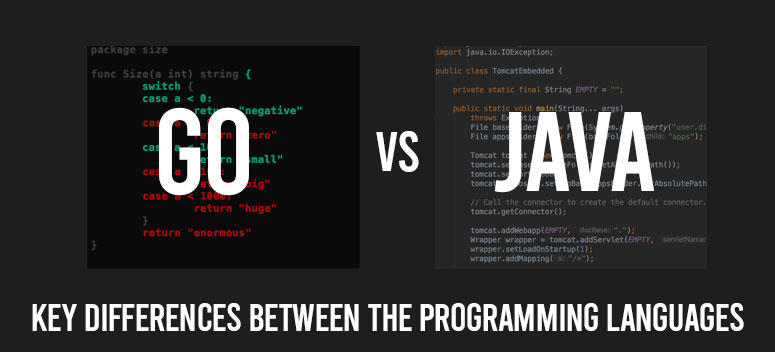
In the age of a constant battle of programming languages, today we are going to discuss the major differences between two of the most famous and capable programming languages Java and Go. Java and Go both are members of the C-family language.
From this piece of information, you can now predict they must have similar coding syntax. And yes your prediction is correct. It is easy for Java developers to read any code written in the Go programming language as the coding syntax is the same for both.
Both Java and Go programming language has made a profound impact on the ecosystem of programming languages. In this blog, we are going to discuss the major differences between these two masterpieces.
But I can feel that you may need some initial knowledge of Java and Go languages. So, for all the newbies out there, let us first get some idea about what Java and Go programming languages are.
What is Java and why it is so famous?
Developed by Sun Microsystems and released in 1995 Java is a high-level programming language that can run on various Operating Systems ( Mac, Windows, and Linux).
Java is a primitive kind of object-oriented programming language to follow the WORA (write once read everywhere) concept. To run the programming on any platform under any computer architecture Java applications are compiled to bytecode.
What is Go or Golang and how did it get so famous?
Golang or widely known as Go is a programming language developed by Google back in the year 2009. Just like Java, it is also a part of the C and C++ family. Therefore you can say that this is an object-oriented programming language.
Designed by Google in the year 2007, the main aim of the Go programming language is to improve programming productivity. Though released to challenge the programming languages giants and avoid some foolish criticism, Google has kept some useful characteristics such as,
- Static Typing and Runtime Efficiency like C++
- Readability and usability like Python and JavaScript.
- High-performance networking and multiprocessing.
I think this is enough information for the newbies or new readers to get an idea about Java and Go programming languages. So, let’s get back to our topic that we are going to discuss in this blog.
What are the major differences between Java and Go programming languages?
Already we have discussed the details of both Java and Go programming languages. Therefore without wasting any more time we can discuss the differences between these two masterpieces.
Architecture:
The architecture of code is very much important as it defines the process and syntax of coding for the user.
Java:
The bytecode of a Java application is interpreted by Java Virtual Machine. Both interpretation and compilation are combined in this language. The machine code generated by Java Virtual Machine (JVM) is executed by the system in a platform which is supported by Java programs.
Go:
Unlike Java, Go does not provide any Virtual Machine (VM). Go programming language only compiles to platforms like C or C++.
Language:
As both the Java and Go are members of the same family of C/C++, they follow a similar kind of language syntax. But let’s see where the difference lies.
Java:
Java is a programming language that can be run on any kind of platforms. You can also transfer your Java code from one system to another. All of this is possible because Java is an independent language
Go:
Go programming language also gives the privilege to the user to write code on any kind platforms. Go is also an independent language. Two of the main compilers of Go are gccgo and go.
Expression Syntax:
A lot depends on the syntax of a programming language. For a coder, it is important that the language must provide a simple and swift syntax.
Java:
For Java, the syntax of the language is the same everywhere on any platform. The most awesome thing is the language is independent of an IDE or any kind of compiler.
Go:
Go programming language runs on an Extended Backus Naur Form (EBNF) specified syntax. Therefore unlike Java, Go does not provide an independent syntax for the coders.
Memory Management:
Memory management of programming languages is necessary and well needed. Let’s have a look, how these programming languages are dealing with memory management.
Java:
In the case of Java, Java Virtual Machine (JVM) does memory management. It provides the user trash collection to perform automatic memory management tasks.
Go:
The Go language is compiled to machine code and executed instantly. This results in the most effective memory management system. The Go language lies between C and C++ because the language is both object oriented and functional to some extent.
Speed:
Every programming language is depended on its performance and compilation speed and efficiency to swiftly compile a set of codes.
Java:
The Java programming language has delivered a lot of things for its coder. It is fast enough to compile lines and lines of code at a swift pace. But as compared to Go programming language, Java is a bit slower in terms of compilation speed.
Go:
Well as compared to Java, the Go programming language is relatively faster and has more compilation speed.
Conclusion:
I think all the confusion in your head is resolved. All the newbies can now understand every word that I have said in this whole blog. This blog can help those readers who are willing to start a new project but cannot decide which programming they should use.
Both the Go and Java programming languages are capable of doing wonders. But in some fields, they slightly differ from each other and you have already seen those points in the above article.
I hope that this article has helped you to decide which programming language you should choose for your purpose.
